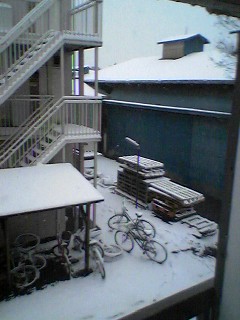Monday in first period, after watching another episode of Churasan (a drama that aired, um, in the '90s?) in class, we had to partner up and reenact dialogue/scenes. Koumatsu-sensei went around listening in on everyone, and when she go to us she told me (and this made me so *happy*) "Your pronuncation is good! You must speak to a lot of Japanese people." Well, I don't. I wonder what happened. Why does my pronuncation suddenly seem better? I thought at first that it was just that we'd just watched Churasan. I've always had a (small) knack for imitating pronunciation or speaking-style after hearing it. (You probably all remember how, when I started studying Japanese, I sounded like an anime character, and then of course there's me learning Megan's Staten Island accent freshman year, and now I pick up British words and vowels from Stu, Chris, and Phil.) But if that was all there was to it, why did so few students say 「がんばってください」[ganbattekudasai] last week when I interviewed them? Maybe there's something to this immersion thing after all, even if I don't consciously speak with very many Japanese people.
Today was a reading day, in which we spend two class periods reading a passage from the textbook and analysing and understanding it together. I try to do the reading before class so that I don't waste time making Sensei explain vocabulary rather than content. (I have a related rant, but I'll get to that later.) So anyway, today I ended up sitting right in front of Suzuki-sensei. You probably all realize now that I think Suzuki-sensei is really sweet and cute, so I guess I smile at her a lot. Today especially I know I smiled at her a lot, because she was being *really* cute!
The reading passage was about the structure of water, which we learn about to some extent in middle school and a greater extent (if you like science) in high school, written for the layman. Normally I'm the only one in class who finds anything related to science fun/interesting (even though I thought today's passage was a little silly because of the way it was written), and Suzuki-sensei has definitely made that connection (she remarked on it today). But today I think Suzuki-sensei also honestly found it really interesting (she explained afterward, when we told her we'd all learned it in school, that she hadn't, maybe because when she was that age it wasn't known). When we read something like "for 100,000,000,000th of a second the arrangement of the water molecules is stationary, but for longer periods of time it is continually changing," she wrinkled her nose and cocked her head to the side and said, "How can they discover that? How do they look at something so small for such a short period of time?" and "So the water in this bottle is moving and changing, but I can't see it. And me! I'm mostly water, and the water in me is constantly moving and changing?!" I thought it was so cute! So I couldn't help but smile. *sheepish* On top of that, when classmates are annoying (because they're not paying attention or whatever), I marvel at Sensei's patience and want her to know that "I see what you put up with and appreciate it," so I guess, as a result, I smile.
So when we broke for lunch today, Suzuki-sensei remarked on how I'm always smiling at her. Immediately I was very embarrassed about it. I know I'd be really weirded out/nervous if someone was constantly smiling at me for no apparent reason. I was so flustered with thinking I made her uncomfortable that I didn't understand her reaction completely (I have to focus all my attention -ears *and* eyes- to really understand, so if I'm flustered it's difficult)... at first she seemed to say it makes her super-self-conscious of when she makes a mistake, but then as she was leaving, she seemed to say that she thought I was... やさしい [yasashii] (
tender; kind; gentle; graceful; affectionate; amiable; suave). Anyway, I'm confused, and now I don't know whether I should keep on keeping on or try to hold back my smiles in case I'm worrying Sensei. What do you think?
So, the rant... Student 1, from my last post. As first period ended, Student 1 looked at the schedule posted on the wall to see what was next. "Reading?! What the f*** am I here for?" It's no secret that Student 1 thinks reading classes are a complete waste of Student 1's time (sidenote: English could really use gender-free pronouns). Of course this means that Student 1 never comes to (reading) class prepared (not that Student 1 is alone in this). Sensei first reads the passage aloud to us once. We then go around the room, each reading a sentence at a time as Sensei quizzes our understanding. So she asks for the three properties of water that make it special over other liquids. They're listed within two sentences quite clearly in the paragraph we just finished reading together. Someone gives one property, and Sensei then asks Student 1 for a second one. But of course Student 1 hasn't bothered to follow along with the class, so has no idea what we're talking about or where to find the answer in the passage, and proceeds to sit there and say that Student 1 simply didn't understand Sensei's question. So then Sensei feels it necessary to explain her question (which was a fairly simple one) in-depth. Hello, Student 1, if you think reading class is already a waste of time, don't make it a *bigger* waste of time. *ahem* Anyway. Student 1 was unable to answer the question, and Sensei eventually moved on to someone else.
We have a short break between second and third period. When everyone returns, even though Sensei has sat down and said "moshi moshi!!" over and over to get their attention, people are chatting away.
I say, "Sensei, you have a lot of patience, don't you?"
She says, "Why do you say that?"
"I think, maybe, we are very difficult students sometimes."
And she smiles and says, "Maybe because the presentations are over now, everyone has relaxed, and is having trouble concentrating."
"Maybe." (But of course I don't really believe it.)
Once they finally quiet down, guess who decides he/she is too cool to take a seat and join the class like everyone else? Student 1 is standing with hands nonchalantly in pockets, leaning against the back wall of the classroom. Sensei says, "Shall we start?" Student 1, without moving, says, "Go ahead."
And I want to punch Student 1 in the face.


